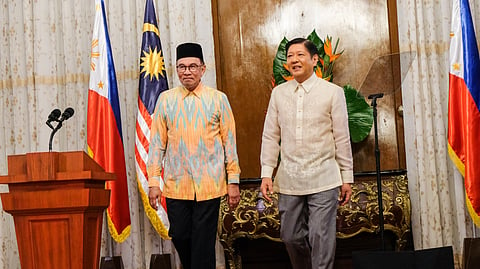
- NEWS
- the EDIT
- COMMENTARY
- BUSINESS
- LIFE
- SHOW
- ACTION
- GLOBAL GOALS
- SNAPS
- DYARYO TIRADA
- MORE

Like China, Malaysia’s protest over the signing of twin laws defining the country’s territorial claims in the West Philippine Sea (WPS) is anchored on an unfounded basis, a senior lawmaker said Monday.
Cagayan de Oro Rep. Rufus Rodriguez urged the Philippine government that in the event that Malaysia pursued its petition, the country should also revive its longstanding territorial claim over Sabah in northern Borneo, which “rightfully belongs to the Philippines by historic right or legal title.”
“Malaysia has no basis for its protest because the reference materials are not part of the two laws. The laws are to be taken in their import and the meaning of their provisions. They do not mention our country’s claim to Sabah,” said Rodriguez, a lawyer, who chairs the House Committee on Constitutional Amendments.
Malaysia’s protest follows President Ferdinand Marcos Jr.’s signing into law the Philippines' Maritime Zones Act and the Archipelagic Sea Lanes Act, both aimed to reinforce the country’s jurisdiction over the resource-rich WPS and its exclusive economic zone.
According to Malaysia's Deputy Foreign Minister Mohamad Alamin, they reviewed the reference documents related to the two laws and found that they touch upon claims to the Malaysian state of Sabah.
As expected, China, which has territorial claims in nearly the entire South China Sea, which overlaps the WPS, also expressed strong opposition to twin laws.
It immediately summoned Philippine Ambassador to China Jaime FlorCruz to assert that the newly enacted laws “illegally includes most of China’s Huangyan Island and Nansha Islands and related maritime areas in the Philippines’ maritime zones.”
Rodriguez asserted that Malaysia’s petition was heavily anchored on some reference materials used in crafting the twin laws, supposedly restating the Philippines' claim to Sabah, which they used to pay for annual rent to the heirs of the Sulu sultanate.
He, however, argued that the two laws “only pertain to our EEZ, computed at 200 nautical miles from our baselines, which does not include Sabah.”
“Our new maritime laws strictly pertain to the seas surrounding the Philippine archipelago. They do not deal with land territories like Sabah,” he said.
The seasoned lawmaker vehemently contended that the enactment of the said laws “is fully in accordance with the United Nations Convention on the Law of the Sea (UNCLOS).”
“Their enactment sends a strong signal to our neighbors and the world of our resolve to defend what is ours under international law and to preserve and exploit resources within our exclusive economic zone for the benefit of all Filipinos,” Rodriguez said.
Marcos said the two laws “emphasize the importance of our maritime and archipelagic identity,” and “improve our capacity for governance and reinforce our maritime policies for economic development and for national security.”
“The Philippines reaffirms its sovereignty, sovereign rights, and jurisdiction in our waters. By defining and asserting our maritime zones, we project to the international community that we are staunchly committed to nurturing, cultivating, and protecting our maritime domain," the President said.
